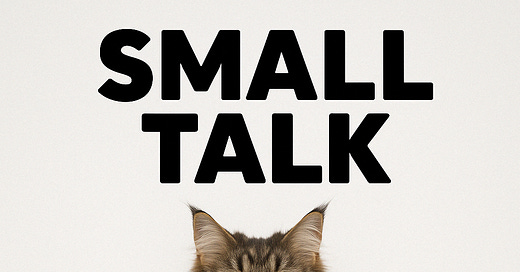The Work of Deep Thoughts About Small Talk
Going big, hard, and deep on the smallest of subjects
Introduction: The Soft Skill of Saying Nothing (and Everything)
Small talk is the art of saying nothing in particular — and somehow saying everything that matters. It's the "Hey, how are ya?" at the office coffee machine, the weather chat with your neighbor, the breezy banter before a meeting gets serious. These little verbal rituals often get dismissed as superficial, even phony.
In an impressionistic essay about small talk that recently went viral,1 I followed a fairly long tradition in arguing that small talk functions as a kind of unwritten contract we all sign without reading, where social interactions often involve people not truly seeking opinions but rather validation. I observed how these exchanges aren't about deception but about the choreography of social life that was established long before any of us showed up. It's a dance where phrases fill space and keep silence at bay.
Dale Carnegie, in his 1936 classic How to Win Friends and Influence People, was perhaps the first to formalize this dance into an all-American playbook of people skills. Long before anyone spoke of "emotional labor" or "soft skills," Carnegie understood that conversation is often performance. His book is full of seemingly simple maxims — smile, remember their name, be a good listener, talk in terms of the other person's interests. These are as much about manners and ritual as about conveying information.
Linguists would call much of this phatic communication — speech that serves a social function more than an informational one. Think of the standard exchange "How are you?" — "I'm fine" where no one is doing a medical check-up; it's just a ritual to signal friendliness. Carnegie didn't use the term "phatic,"2 but he intuitively encoded phatic communication and ritualized small talk into his advice on winning friends and influencing people.
Nearly a century later, we're still grappling with the legacy of Carnegie's cheerful soft-skill gospel. Modern professional development courses, entire industries devoted to "people skills," the exhortations to maintain our "emotional intelligence" at work — all these are offshoots of Carnegie's basic idea that how we interact matters as much as, if not more than, what we actually do or say.
In our post-pandemic3 world of Zoom meetings and sheltering at home, there's even talk of a "soft skills crisis" — a fear that after years of isolation, people have forgotten how to small-talk and schmooze. At the same time, critiques of emotional labor (the requirement to smile, be friendly, and manage emotions as part of a job) have complicated our view of all this friendly performance. Is small talk a comforting social ritual or a burdensome act of emotional labor? Is following Carnegie's advice genuine or manipulative? And how do these interactions balance between authentic connection and performative politeness?
Together, we’ll sift through Carnegie's original text, examining how he constructs a template for small talk and politeness as tools for navigating social and professional life. We'll then zoom out to see Carnegie's legacy in today's soft-skills training industry and the zeitgeist of post-pandemic interpersonal anxiety (as captured in Lily Scherlis's recent Harper's article "Going Soft").
Throughout, we'll loop back to themes from my short Substack essay that I wanted to develop further but lacked the space or motivation to explore: the performative nature of social exchanges, the gap between genuine connection and social obligation, and how we navigate the spaces between meaningful interaction and mere time-filling.
With all this in mind, let's break the ice (Carnegie would approve). How did a farm kid and University of Central Missouri alum end up teaching us all how to smile and chat our way to success?
Keep reading with a 7-day free trial
Subscribe to Oliver Bateman Does the Work to keep reading this post and get 7 days of free access to the full post archives.





